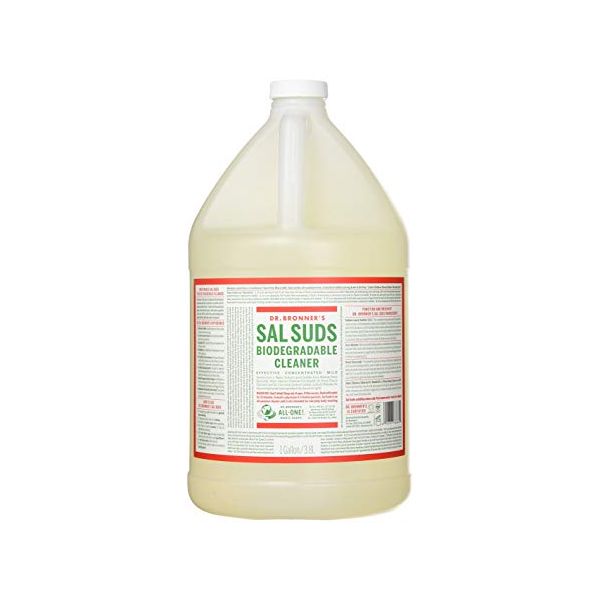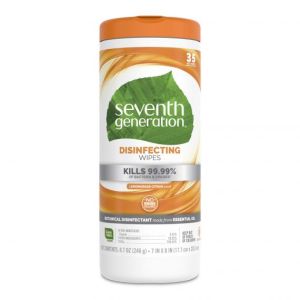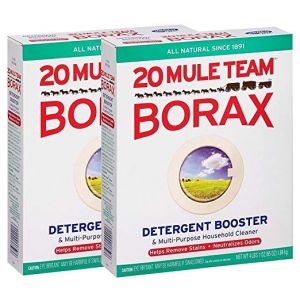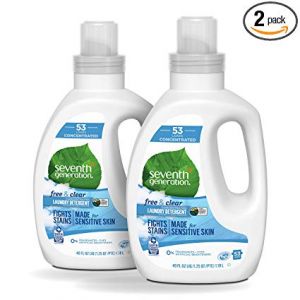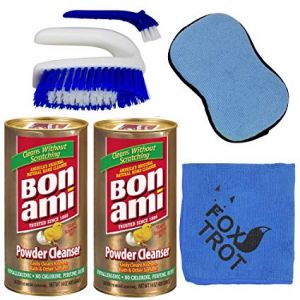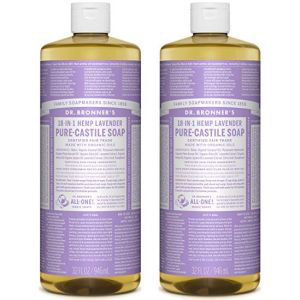Dr. Bronner's Sal Suds Biodegradeable Cleaner
946 ml, 32 fl oz
Exceptionally powerful biodegradable all-purpose cleaner made with plant-based surfactants for laundry, dishes, floors, or any other tough cleaning jobs. The powerful formula contains a combination of organic ingredients and fair trade ingredients as well as naturally pleasant scents such as Fir and Spruce oil.
Best For
All-purpose cleaner (Home/Car/Office) [1-3]
Results
5/5
- Pros:
- Highly versatile, concentrated, biodegradable, organic, plant-based all-purpose cleaner for floors, laundry, dishes, etc.
- For (tile, wood, vinyl, granite, plastic, stainless steel),Treated leather,Microsuede,Synthetic fabrics,Windows,Glass,Cars,Patio furniture,Paint brushes and more
- Purest organic ingredients and fair trade ingredients
- Fir and Spruce oil provide naturally pleasant scents
- Plant-based surfactants
- Exceptional cleaning power, yet gentle on the skin
- Works with hard or soft water
- Rinses well with hot or cold water
- Certified by the Coalition for Consumer Information on Cosmetics
- Phthalate-free
- Ammonium-free
- Cruelty-free
- Free of synthetic preservatives, dyes, fragrances, detergents, and foaming agents
Ingredients Concern: Potassium hydroxide has a 2-5 EWG score, depending on its usage
Cons: Don't drink, Keep out of eyes, If this occurs, flush with water for 15 minutes, Consult a physician if irritation persists, Sal Suds is an all-purpose cleaner, and is not intended for everyday body-washing use
You have probably seen the Dr Bronner's soaps brand at Whole Foods or a local health store, but you probably didn't know the amazing story behind the brand. Dr. Bronner's company was founded in 1948 by Emanuel Bronner, a third- generation master soapmaker from a German-Jewish soapmaking family. He continued soapmaking in Germany during the war until the Nazis took over, nationalized his family's soap factory and then sent his parents to Auschwitz where they died. Dr Bronner eventually went to a mental institution and received shock treatments. He later escaped and went to the USA, where his clean ingredient brand became iconic in the 1960s by using global unity messages on his soaps like We are All-One or None! Today, the company is still family-owned and run, and they continue to make socially & environmentally responsible products of the highest quality, and give some of their profits to great charitable causes. Dr Bronner's products have organic and fair trade ingredients, most of which are vegan and certified to the same organic standards as food. There are no synthetic preservatives or foaming agents. Today, Dr Bronner's children run the company and sell products for the body, hair, face, mouth, teeth, food, dishes, laundry, mopping and pets.
According to research, Sodium Lauryl Sulfate (SLS) is a safe cleaning agent that is frequently added to household cleaning products [1].
In terms of coco-betaine, the only research available pertains to the safety of using cocamidopropyl betaine in cleaning products, although it is not the same as coco-betaine [2]. Coco-betaine is derived from coconut oil.
According to research, decyl glucoside has the highest frequency of use in cosmetics and cleaning products due to its grease (oil)-fighting properties [3].
All-purpose cleaner (Home/Car/Office) [1-3]
Sodium Lauryl Sulfate (SLS) is an anionic surfactant that is also known as sodium laurilsulfate or sodium dodecyl sulfate. It is commonly used as an emulsifying cleaning agent in spray cleaners, laundry detergents, and dishwasher detergents [1]. In addition, SLS is nonvolatile and water-soluble [1].
In terms of coco-betaine, the only research available pertains to the safety of using cocamidopropyl betaine, which is a zwitterionic ammonium compound used primarily as an amphoteric surfactant in cleaning products [2]. However, it is not the same as coco-betaine [2]. Coco-betaine is a monoalkyl-amine derived from coconut oil.
Decyl glucoside is typically soluble in both aqueous and organic solutions, and it has the highest rinse-off rate in comparison to other alkyl glucosides [3].
Key Ingredients: Sodium Lauryl Sulfate, Coco-Betaine, Decyl Glucoside
All Ingredients: Water, Sodium Lauryl Sulfate, Coco-Betaine, Decyl Glucoside, Abies Siberica (Siberian Fir) Needle Oil, Picea Glauca (Spruce) Leaf Oil, Citric Acid, Sodium Sulfate, Sodium Chloride, Potassium Hydroxide
1. 1-1/2 teaspoons per gallon water will clean your whole house. 2. 1-1/2 teaspoons does a sink of dishes. 3. Pour some directly on fabric stains before washing. 4 Use a 1/4 cup for a load of laundry. 5. Use it for cars, floors, rugs, and any other surface that is safe in contact with water, even wood floors. 6. For extra heavy jobs, cut it in half or use it straight.
These statements have not been evaluated by the FDA. These products are not intended to diagnose, treat, cure or prevent any disease.
1. Bondi CA, Marks JL, et al. Human and Environmental Toxicity of Sodium Lauryl Sulfate (SLS): Evidence for Safe Use in Household Cleaning Products. Environ Health Insights. 2015 Nov 17;9:27-32. doi: 10.4137/EHI.S31765. eCollection 2015.
2. Final Report on the Safety Assessment of Cocamidopropyl Betaine. Journal of the American College of Toxicology. 1991;10( 1): 33-52.
3. Cosmetic Ingredient Review. (2011). Final Safety Assessment: Decyl Glucoside and Other Alkyl Glucosides as Used in Cosmetics. Retrieved from http://www.beauty-review.nl/wp-content/uploads/2014/06/Decyl-Glucoside-and-Other-Alkyl-Glucosides-as-Used-in-Cosmetics.pdf
Write Your Own Review

